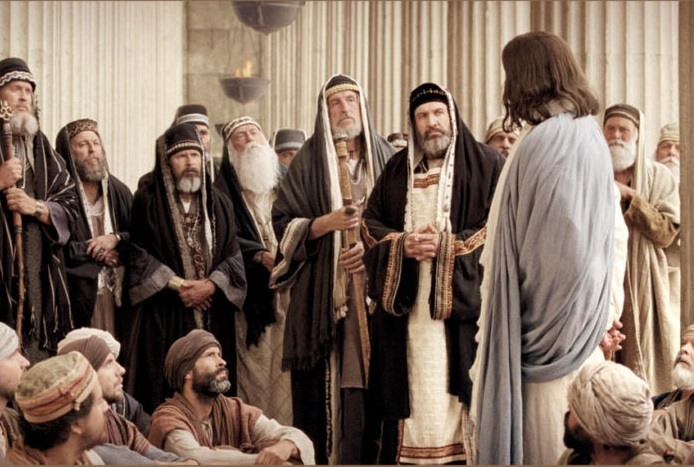Exposing Christian Myths: The Bible does NOT Teach that Believers Should Always Obey the Government
by Brian Shilhavy, Health Impact News:

One of the most common myths taught in Christianity today, and since the “Reformation” period in Europe in the 1700s, is that believers in Jesus Christ are taught to always obey our government.
The passage in the New Testament part of the Bible that is used by pastors and other Christian “leaders” today to try and convince people that they need to always obey their government, is from Paul’s letter written to the congregations who were in Rome at the time.
TRUTH LIVES on at https://sgtreport.tv/
Every person is to be subject to the governing authorities, for there is no authority except that which God has established.
The authorities that exist have been established by God.
Consequently, he who rebels against the authority is rebelling against what God has instituted, and those who do so will bring judgment on themselves.
For rulers hold no terror for those who do right, but for those who do wrong. Do you want to be free from fear of the one in authority?
Then do what is right and he will commend you. For he is God’s servant to do you good.
But if you do wrong, be afraid, for he does not bear the sword for nothing. He is God’s servant, an agent of wrath to bring punishment on the wrongdoer.
Therefore, it is necessary to submit to the authorities, not only because of possible punishment but also because of conscience.
This is also why you pay taxes, for the authorities are God’s servants, who give their full time to governing. Give everyone what you owe him: If you owe taxes, pay taxes; if revenue, then revenue; if respect, then respect; if honor, then honor. (Romans 13:1-7)
The first thing one must do to understand this passage, is consider who these instructions were written to, and what their situation was that prompted Paul to write a letter to these congregations, which included this passage at the beginning of the 13th chapter.
Who were the People that this Letter was Sent to?

The letter was written to “all those in Rome who are loved by God and called to be saints.” (Romans 1:7)
These believers lived in Rome, the capital of the Roman Empire. They were mostly Jews, but also some Gentiles, who believed that Jesus Christ was the Messiah, and had risen from the dead.
Paul had as of yet never visited Rome when he wrote this, so he was writing to people whom he had never met yet, but only heard about.
So his letter is an exposé on the Good News (Gospel) regarding the New Covenant that Jesus fulfilled as the Jewish Messiah.
It is a masterpiece in ancient literature.
What was Happening in Rome that Prompted What Paul Wrote in the Beginning of Chapter 13?
We know from the biblical literature that Jews were at odds with the Roman Government during the 1st Century.
In Acts 16, Paul mentioned that some fellow believing Jews from Rome had joined him, because they were forced to leave Rome by the Roman Emperor Claudius.
And he found a Jew named Aquila, a native of Pontus, recently come from Italy with his wife Priscilla, because Claudius had commanded all the Jews to leave Rome. (Acts 18:2)
From the historical records, we know that the conflict between the Roman government and the Jews accelerated after Claudius was poisoned, and the Emperor Nero took his place. There had been a massive fire in the city of Rome, and Nero blamed it on the Jews.
Many of the Jews were revolting against Rome, whose empire at that time included occupying Israel, and many of these Jews were among a political faction of Jews referred to as “Zealots.”
The Zealots were a group of Jews who began to emerge as a religious/political movement around the beginning of the 1st century CE.
They strongly opposed Roman rule and turned on everyone, including other Jews, who cooperated with Rome. A subgroup of them, known as the Sicarii, frequently attacked Romans and those considered to work for them.
The Zealots emerged as a religious/political movement in the 1st century CE. Most of our information about the Zealots comes from the Jewish historian, Flavius Josephus (36-100 CE), who was also an eyewitness to the Great Jewish Revolt of 66 CE.
In both The Antiquities of the Jews and The Jewish War, Josephus described the various Jewish sects of schools of philosophy.
The Zealots were called “the fourth sect.” According to Josephus, the movement began with Judas of Galilee, who, along with Zadok the Pharisee, founded the fourth sect.
When a new Roman governor, Quirinius, was appointed in Syria who also oversaw activities in Judea, these two led a tax revolt in the year 6 CE. This was the census mentioned in Luke’s nativity story. (Source.)
The Zealots believed that Israel should never cooperate with countries who oppressed them, but that they should seek to overthrow their government.
We know that there was at least one Zealot who was listed among the 12 apostles who followed Jesus:
And when day came, he called his disciples and chose from them twelve, whom he named apostles: Simon, whom he named Peter, and Andrew his brother, and James and John, and Philip, and Bartholomew, and Matthew, and Thomas, and James the son of Alphaeus, and Simon who was called the Zealot, and Judas the son of James, and Judas Iscariot, who became a traitor. (Luke 6:13-16)
Barabbas, who is described as “a notorious prisoner” and was chosen to be released from prison to go free in place of Jesus who was condemned to death (see Matthew chapter 27), is also thought to have been a Zealot, as well as the two “thieves” who were executed on crosses beside Jesus.
Read More @ HealthImpactNews.com


